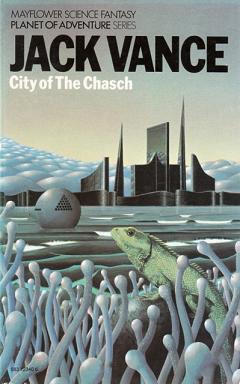
City of the Chasch
Jack Vance
172 pages
published in 1968
When I first started to discover science fiction (longer ago than I care to recall) Jack Vance was one of the more popular writers to be translated into Dutch and the local library therefore had a shitload of his books. I therefore read quite a lot of his work, including the whole Planet of Adventure/Tschai, the Mad Planet (as it was called in Dutch) tetralogy, in one of those big omnibuses Meulenhof specialised in. There’s little I remember off it, to be honest, other than that it was a typical Vancean planetary romance.
Jack Vance is of course the master of this subgenre, effortlessly creating new worlds and societies for his stories, always exotic and strange yet believable and with their own logic. Sometimes the stories he sets in these worlds disappoint, as was the case for me when I reread Big Planet two years ago. For City of the Chasch I had less expectations, just because I remembered less about it, but I was still a bit disappointed with it. Like Big Planet, the worldbuilding here is more sketched in than fleshed out, not as rich and interesting as I had hoped it would be. I had planned to read the next books in the series immediately (I’m still missing the fourth) after I’d finished this one, but now I’ll think I’ll pass.
As said, City of the Chasch is a classic example of a planetary romance, the science fiction equivalent of one of those fantasy grail quests that visits every place on the map in the front of the book. It all starts when a spaceship finds radio signals coming from a star system no humans are supposed to be, goes to investigate and is blown up just as it had launched a scout ship to the surface. This crash lands, one of the pilots is killed by one of the tribesmen who were drawn to the crash site, but the other, Adam Reith is luckier, caught with his parachute in a tree and not yet discovered, yet helpless to get himself down as well. And then an airsled arrives and sets down and out come Blue Chasch and Chaschmen to examine the crashed ship, but before they can do anything another ship arrives filled with Dirdir and Dirdirmen, who are immediately ambushed by the Blue Chasch, who kill them all and then take the spaceship away. Reith meanwhile is taken prisoner by that first tribe of humans and is taken to their camp.
That human tribe is an excellent example of Vance’s ingenuity in creating new cultures. They call themselves the Emblemmen and each male member of the tribe wears an emblem on their hat that defines their personality and character, with each emblem having a long history, being passed down from man to man whenever an emblem wearer dies or has his emblem taken from him. The women on the other hand are little more than slaves, emblemless and worthless. Reith himself is also little more than a slave. If he wants any chance of getting back to Earth, he needs to find his scoutship; luckily he still has his scanner so he knows where it is, he just has to get there.
Easier set than done, but he does manage to escape the tribe, setting out together with one renegade tribesman, Traz Onmale. Onmale is a sombre, serious young man, worried about life outside the tribe, but willing to go along with Reith. Some days later sheltering in the ruins of a Phung city, the Phung being the native sentients of Tschai, Reith rescues a Dirdirman, Ankhe at afram Anacho, Anacho for short, who despite a renegade, is proud of his Dirdir heritage. Reith himself meanwhile is getting more and more annoyed with how subservient men are to the various alien races on Tschai, but still thinks of nothing but wanting to go back home. But first he’ll have to get his ship back.
And that means trekking across an entire planet filled with almost half a dozen alien races and their human followers. Apart from the Dirdir and Chasch (Blue and Green) as well as the native Phung, there are also the Pnume and, most amusingly, the Wankh. So he and his companions set off to the city of the Chasch to go get his ship, with the usual sort of adventures on the way.
The story, though decent enough, never really held my attention; always a bad sign when I’d rather stare out of the train window than read a book on my commute to work. I’m not quite sure why this was, perhaps because it was all a bit formulaic or the characters were never more than cliches. There were some good bits; the Emblemmen, the various pieces of local colour, some of the setpieces later in the book, but it never gelled for me. A pity, because I would’ve liked to have liked this more.
No Comments